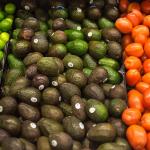Buying locally grown food has advantages; transportation costs are reduced, and it increases the availability of fresh produce.
Food deserts
The Trump administration’s has proposed to create deliverable food for SNAP participants, a "Blue Apron” for those without disposable wealth.
Food deserts are communities without a supermarket, found primarily in low-income neighborhoods. We have evidence from a variety of studies that the diet of folks living in these areas is less than nutritious, at least based on USDA criteria.






